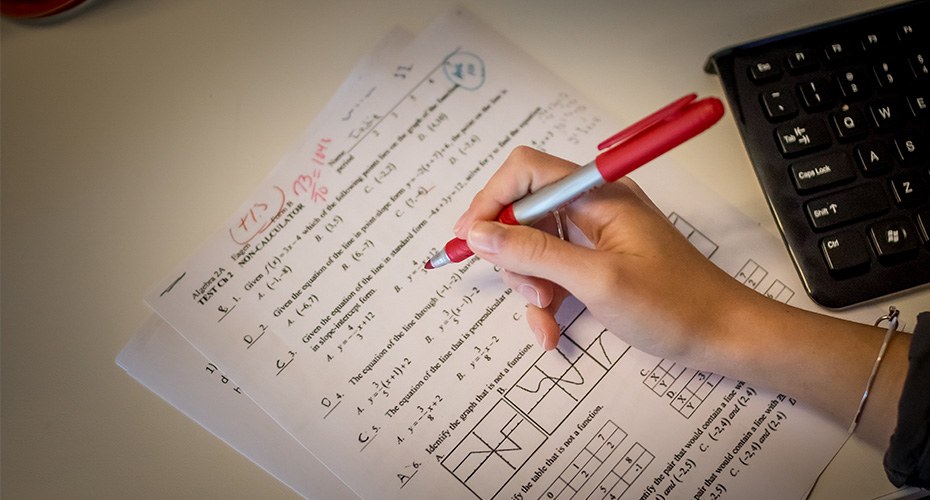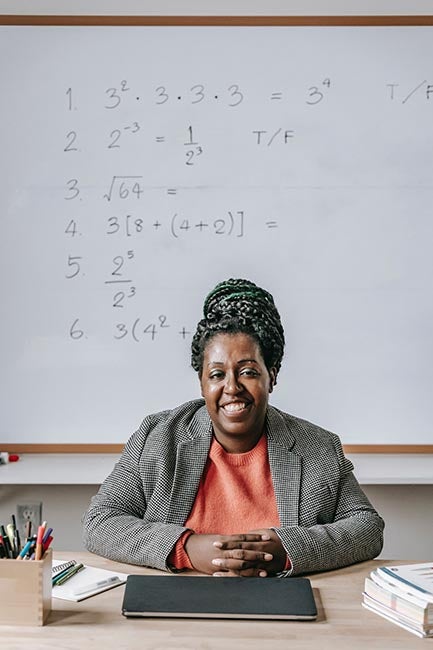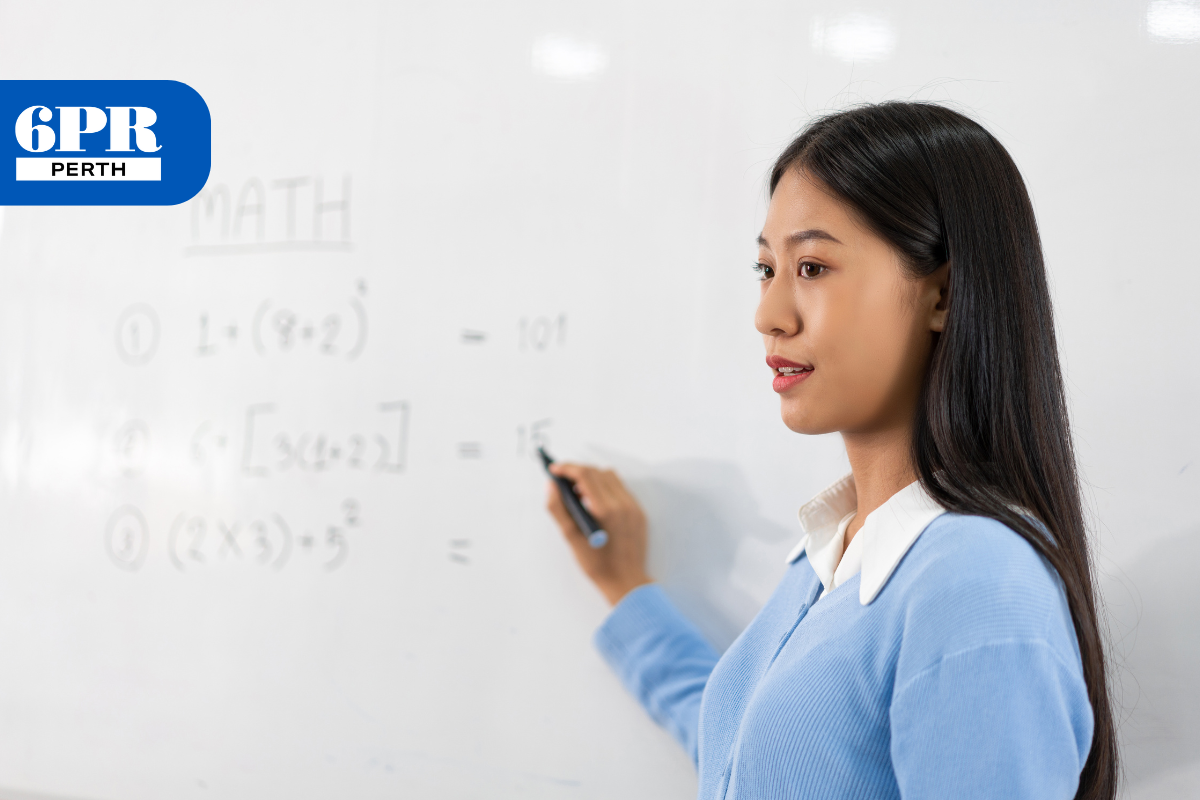Everything About Qualified Math Teachers: Their Duty in Fostering Trainee Growth and Success in Math Education
Certified mathematics instructors are important in shaping students' understanding and appreciation of mathematics. Their deep expertise and effective training methods can greatly affect trainee outcomes. These educators not only present mathematical skills but also cultivate an inclusive atmosphere that fulfills varied finding out needs. As they adopt ingenious techniques, the question arises: exactly how do these approaches specifically boost trainee engagement and accomplishment in math?
The Significance of Qualified Mathematics Educators in Education And Learning
Although many elements add to student success in mathematics, the existence of qualified math teachers sticks out as a crucial component in fostering efficient learning environments. Study continually suggests that pupils educated by teachers with strong mathematical backgrounds tend to demonstrate higher levels of understanding and accomplishment. Certified math educators not just have a deep understanding of mathematical principles however likewise the pedagogical abilities needed to convey complicated ideas in easily accessible ways. They can identify pupils' private requirements and adjust their teaching methods appropriately, promoting inclusivity and involvement. Additionally, their competence permits them to develop a positive class atmosphere that motivates risk-taking and durability in analytic. This encouraging atmosphere fosters a growth way of thinking amongst pupils, boosting their self-confidence and motivation in mathematics. Generally, qualified math instructors play an important role fit trainees' perspectives toward mathematics, inevitably influencing their future opportunities and scholastic trajectories.
Secret Top Qualities of Reliable Math Educators
Efficient mathematics instructors have a number of crucial top qualities that boost their training effectiveness. These consist of deep subject understanding, strong communication skills, and flexible mentor approaches that satisfy diverse knowing demands. Identifying and growing these qualities can greatly affect trainee understanding and involvement in mathematics.
Deep Topic Knowledge
While a solid pedagogical strategy is crucial, deep subject expertise stays a keystone of effective math educators. Such understanding allows educators to comprehend mathematical principles extensively and to prepare for trainee misunderstandings. Educators with a solid grasp of mathematics not just supply content with confidence however additionally link numerous topics, promoting a richer discovering setting. They are equipped to use varied training methods that provide to different knowing styles, making complex ideas extra easily accessible. Deep subject expertise empowers teachers to engage in significant discussions with students, encouraging important thinking and analytic abilities. Inevitably, the deepness of understanding that math instructors possess greatly affects trainees' academic development and success in maths, laying a strong foundation for future discovering.

Strong Interaction Abilities
Deep subject expertise alone wants for promoting an efficient understanding setting in maths; strong interaction abilities are similarly crucial for effective mathematics educators. These abilities enable educators to share complicated ideas in obtainable methods, making certain that pupils understand fundamental ideas. Efficient communication involves not only clearness but also the capability to actively listen, urging trainee engagement and dealing with mistaken beliefs. By fostering an open dialogue, teachers produce a helpful class atmosphere where students really feel comfortable asking concerns and revealing their ideas. Furthermore, strong communicators can adapt their language and descriptions to fit diverse knowing styles, enhancing trainee engagement and comprehension. Ultimately, reliable interaction bridges the void in between an educator's expertise and a trainee's understanding, considerably affecting scholastic accomplishment in maths.
Adaptive Teaching Techniques
A variety of adaptive teaching techniques are important for effective mathematics teachers intending to meet the diverse requirements of their students. These strategies enable instructors to customize their guideline based on private discovering passions, capacities, and styles. qualified math teachers. Strategies such as set apart instruction, where educators change content, process, or item, help address differing efficiency degrees. Furthermore, including modern technology and interactive tools can enhance engagement and promote tailored understanding experiences. Formative analyses allow teachers to check progress and readjust mentor approaches accordingly. Joint group job promotes peer understanding, promoting a helpful atmosphere. By using these adaptive techniques, mathematics educators can produce inclusive class that motivate all pupils to grow and accomplish their academic objectives, ultimately cultivating a love for mathematics
Ingenious Training Approaches Employed by Mathematics Teachers
As teachers look for to involve trainees more successfully, cutting-edge training methods have become a centerpiece in math classrooms. These strategies intend to boost understanding and retention of mathematical principles. One noticeable technique is the use of technology, such as interactive software program and online simulations, which allows trainees to picture intricate problems and obtain prompt feedback.Additionally, project-based knowing encourages collaboration and real-world application of mathematics principles, promoting essential believing skills. Gamification, where math ideas are integrated right into game-like atmospheres, has additionally obtained appeal, making finding out more enjoyable and motivating for students.Moreover, separated direction dressmakers lessons to accommodate varying skill levels, ensuring that all students can advance at their own pace. By employing these cutting-edge methods, math instructors develop dynamic learning experiences, inevitably advertising better pupil growth and success in mathematics.
Developing Inclusive Knowing Settings
Developing inclusive knowing environments in mathematics education involves implementing varied learning strategies and promoting joint group tasks. These techniques satisfy the varied demands of students, making certain that every person has the possibility to involve and do well. By prioritizing inclusivity, mathematics educators can cultivate these details a class atmosphere that supports all students.
Varied Discovering Approaches
While lots of educators endeavor to cultivate comprehensive knowing settings, carrying out diverse understanding approaches is vital for successfully getting to all students. These methods incorporate an array of training approaches tailored to fit differing discovering capabilities, designs, and backgrounds. Including visual aids, manipulatives, and technology can engage students who might battle with conventional guideline. Additionally, distinguished direction permits educators to customize assessments and assignments, making sure that every student can access the curriculum at their own level. Culturally responsive rearing additionally plays a significant role in acknowledging and valuing the diverse experiences of pupils, therefore boosting their connection to the material. By utilizing these varied understanding strategies, certified math instructors can develop an encouraging environment where all trainees are encouraged to succeed in mathematics.
Collaborative Group Activities

The Impact of Competent Mathematics Educators on Pupil Accomplishment
The existence of qualified mathematics teachers significantly influences trainee success, as effective guideline can connect spaces in understanding and cultivate a favorable knowing atmosphere. Research suggests that pupils taught by seasoned instructors show higher levels of efficiency in mathematical principles contrasted to their peers. Certified math instructors have a deep understanding of mathematical web content, enabling them to present material in diverse manner ins which provide to various finding out styles. This flexibility not just improves comprehension but additionally increases pupil confidence in their abilities.Moreover, certified teachers frequently use formative assessments to keep an eye on student progress, allowing for timely interventions when required. Their capability to produce appealing lessons urges student engagement and promotes a find out here now development state of mind. Therefore, the impact of qualified math educators prolongs beyond mere academic efficiency; it cultivates a sense of curiosity and strength in trainees, eventually bring about boosted results in mathematics and a more powerful foundation for future learning.
Strategies for Involving Trainees in Mathematics
Engaging trainees in math needs a complex strategy that includes diverse techniques to catch their rate of interest and boost understanding. One reliable approach is making use of real-world applications, enabling pupils to see the relevance of mathematical ideas in day-to-day life. Incorporating technology, such as interactive software and online resources, can additionally foster interaction by offering vibrant understanding experiences.Group work encourages cooperation, making it possible for trainees to discover from one another and establish analytic skills in a supportive setting. Furthermore, integrating video games and hands-on activities can make finding out more satisfying and accessible.Differentiated instruction provides to different discovering designs, ensuring that all trainees can get in touch with the product. Lastly, offering prompt responses assists students acknowledge their development and locations for improvement, cultivating a development attitude. By utilizing these click for info strategies, educators can develop an interesting math classroom that advertises pupil development and accomplishment.
The Function of Professional Advancement in Enhancing Mathematics Training Skills
While lots of instructors recognize the relevance of efficient teaching approaches, expert development plays a vital role in improving math mentor abilities (qualified math teachers). Continuous training opportunities enable teachers to remain present with pedagogical improvements, mathematical material, and technical devices. Seminars and workshops give online forums for teachers to collaborate, share finest techniques, and talk about challenges they come across in the classroom.Furthermore, expert growth promotes a growth frame of mind among educators, urging them to review their techniques and adapt their approaches based on student demands. This recurring knowing process not only boosts instructors' mathematical understanding however also furnishes them with innovative educational methods that can result in improved pupil engagement and achievement.Ultimately, a structured specialist growth program can substantially affect the quality of mathematics education and learning, guaranteeing that educators are well-prepared to motivate and direct their pupils towards success in mathematics
Often Asked Inquiries
What Certifications Are Required to End Up Being a Mathematics Instructor?
To come to be a math teacher, people usually need a bachelor's level in mathematics or education and learning, training certification, and a solid understanding of mathematical principles. Added certifications may include specialized training in pedagogy and classroom administration skills.

How Do Math Educators Assess Pupil Progression in the Class?
Math instructors examine trainee development via various approaches, including tests, tests, and jobs (qualified math teachers). They additionally make use of observational assessments and trainee engagement to evaluate understanding, adjusting instruction based on specific and team performance to boost finding out end results
What Obstacles Do Math Teachers Commonly Face?
Math educators commonly encounter difficulties such as differing trainee skill degrees, restricted sources, educational program constraints, and the demand to engage pupils properly. In addition, they commonly come across stress to enhance standard test scores and manage class behavior.
How Can Parents Assistance Their Youngster's Mathematics Education?
Parents can sustain their child's math education and learning by providing a favorable knowing setting, participating in math-related activities, motivating a positive mindset in the direction of obstacles, and preserving open communication with educators to monitor progress and address problems.
What Resources Are Offered for Math Educators to Improve Their Abilities?
Various resources are available for mathematics teachers, including online programs, specialist advancement workshops, peer partnership groups, educational internet sites, and training journals. These tools enhance training techniques, grow subject knowledge, and inevitably improve trainee knowing outcomes in mathematics. Certified math educators are necessary in shaping trainees' understanding and admiration of maths. Many variables add to pupil success in mathematics, the presence of qualified math teachers stands out as an essential element in promoting reliable understanding atmospheres. In addition, qualified mathematics teachers facilitate these communications by purposefully grouping students, making certain that each group has a mix of ability degrees and histories. The presence of qualified math teachers substantially affects trainee accomplishment, as reliable instruction can bridge spaces in understanding and cultivate a positive understanding setting. Math educators typically deal with obstacles such as differing trainee ability levels, minimal resources, educational program constraints, and the demand to engage pupils effectively.